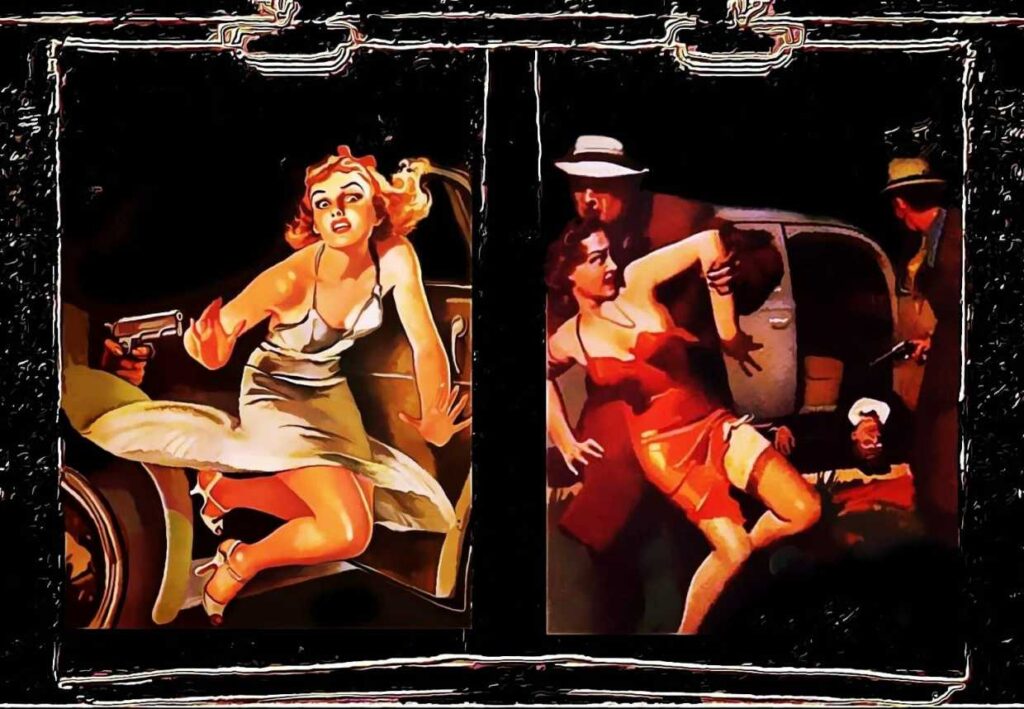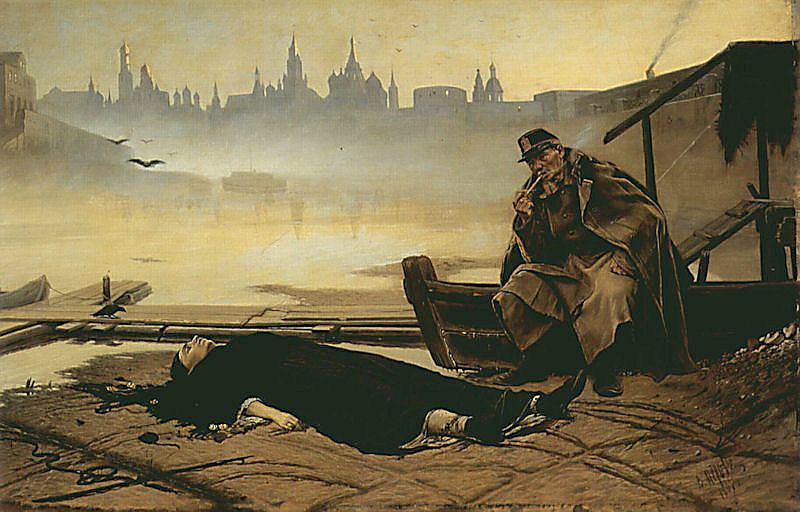Thursday’s Money by Grant Tracey

Thursday’s Money by Grant Tracey
Slipping free would be tough.
The ropes weren’t nylon but hemp. Coarse fibers scuffed and cut into the skin of his wrists.
Across from him was a woman who was also roped about the wrists and ankles. She smiled briefly. “I was afraid you weren’t ever going to wake up—”
Honeycombed amber clogged his brain, the world bright with sticky tar.
Last he remembered: a house shaped like a ski lodge, a makeshift camera club set—four, five members of Winsome’s Chamber of Commerce—and then razor lines of party crashers in black shirts, matching porkpie hats, and skinny ties. Armalite AR-18 assault rifles held tightly—
“I lied to you,” Deborah Valley confessed two hours earlier as Eddie parked his cab along the gravel horseshoe fronting the ski lodge.
Hexagonal lamps burned dimly and seven to eight blocky sedans rested near a berm of white brick. Douglas Firs twisted gently.
Eddie lit a Lucky.
“I didn’t want a lift home—” Her blue eyes wandered. “I’m making $200—” Cheesecake. Calendar art, she said. The Captains of industry were friends of her boss Nelson Griggs. Every Thursday they played a high-stakes poker game in one of the empty rooms above Winsome’s Armory. Griggs owed them money. They had carried him for weeks and it was time to pay. Deborah was a secretary at Yonge and Beggert, Winsome’s leading realtor, and promised to “help” her boss—“I kind of like him.” Her biscuit-colored hair was cut in a pageboy and gave her skin a papery tint. “The corners of his lips go up funny when he smiles—I just go for it—”
“Hmm—”
The camera club thing was “a hobby” for Griggs’s friends. They made weekend trips to Manhattan now and then to visit them. She shrugged and looked through Eddie’s shoulder. Her hands clutched a macrame purse. “I asked you to come for protection, in case there’s any funny business.”
“I’m no bodyguard—”
She knew about Eddie’s bronze star, Korea, 1952. She also knew that he had saved a woman’s life, a customer who tried to kill herself with liquor and pills at the Daw’s Motel. Eddie had dropped her off, noticed she didn’t have any bags, and after his next call checked back in on her—just in time. “You care.”
Eddie rubbed at the corners of his mouth. “What’s in the bag?”
“A bikini—”
Eddie smiled. “That’s some camera shoot.” He lit a second cigarette. “I’ll come with you—”
“As my bodyguard?”
“Fuck, yeah—”
Now, they were in a barn. Bits of moonlight shot through the separation between wood slats.
One of the fellas back there had rapped Griggs across the mouth with the butt stock of his assault rifle, knocking out some teeth. “Right after that you got pistol whipped—”
Eddie couldn’t remember much—but his head sure did. “I take it they didn’t knock you out—?”
“They didn’t—”
“So what’s going on?” The tips of Eddie’s shoulders, the top of his knees, and the ends of his fingers were cold.
Deborah’s eyes darkened. They’re planning to rob the Second National Bank, my father’s bank. “He’s a manager there. Every Wednesday he and a crew of seven work late getting vouchers ready for the bi-weekly run on Thursday’s money. That’s when the folks at the Sizemore pulp and paper mill get paid.” She smiled in a lopsided, off-handed way. “If Dad doesn’t cooperate they promise to kill me, and you—”
“How many of them were there?”
“Five—They also hauled my mother and sister off to a different, undisclosed location.” She heard them plotting while they drove Eddie and her to this empty tobacco farm. “Something to do with garden materials, a dirty bomb—”
“High accelerant fertilizer,” Eddie said. “Two sets of hostages. Clever—”
“The four CEOs are locked up with my mother and sister—”
“And Nelson?’”
“They didn’t lock him up—”
Eddie shrugged. “He could be in on it—”
“In on it? They knocked out his teeth—”
“Assault rifle, an Armalite 18—” The ex radio operator in Korea had kept up on ordinances. “It was invented around 62 or 63—” Used by NATO, he said more to himself than her. “And I still think Griggs is the inside man—What better way to pay off his debts than to organize a bank heist?” Eddie shook some of the amber tar loose in his head. “A few knocked out teeth makes a good alibi—”
“I can’t believe that—”
“You like the fella, of course you can’t believe that—but—” He didn’t want to talk about Korea.
The floor was damp and cold and covered with scattered crosses of straw. Stars glimmered through spots of wood. Their diamond patterns matched the designs on Deborah’s cardigan sweater. The teeth of her down jacket’s zipper were torn loose from the fabric tape and heat seal patch. Eddie pointed with his eyes. “They do that?”
She nodded.
Eddie scuttled, fingers stretching into the slanted pockets of his leather jacket. They clawed loose wooden matches under a deck of Luckies.
Two or three fell. Eddie struggled to pick them up.
The first match didn’t catch on the handle of the plow to his left.
The second did.
The flames bit and spit at a small crumpled teepee of straw.
He placed roped hands over the flame.
The offices of Yonge and Beggert smelled of cigarettes and aftershave. Eddie and Deborah ate cheese sandwiches and picked over listings that hadn’t moved in sometime. The farm that they had been holed up in was listed for over six months.
It hurt to hold the sandwich.
“You should get that looked at—”
“There’s a lot of things I should have done,” Eddie said. Thirty-seven and he still didn’t own his own cab. He still slept with a gun under his pillow. And when he smoked, he still cupped his cigarette so no one could see the burning end. “My money’s on the bowling alley.” He pointed at the listings. “The place has been dark since 1962.” Four years.
Valley Park Lanes was on the west end near the Community Ice Arena. In 1959, the new and improved Mohawk Bowl, with its 32 lanes and black light Tuesdays, opened downtown near the Armory, and that was the death knell of Valley Park.
“No one would look in an abandoned bowling alley for hostages,” Deborah agreed.
Eddie had retrieved his army-issue .45 from his trailer court home. He tucked it in the back of his chinos and zipped up his leather jacket. But a .45 wasn’t enough ordinance against assault rifles.
Deborah smothered a delicate laugh. “Dad has a flamethrower—”
“What?”
He was a supply sergeant in WWII, she said. Before the war he was a CPA. “With his actuarial skills, he could commandeer anything: reams of paper, three or four office desks, a helicopter.” Somehow he grifted a flamethrower for “his personal use.”
That cracked Eddie up. “We don’t know how many people are in Valley Lanes, but a flamethrower—Christ that’s a helluva a leveler. Does it work?”
“We had a problem with groundhogs digging into the foundation of our house last summer. We no longer have a problem—”
Eddie’s head was a drowning honeycomb and the conical light of the desk lamp hurt his eyes. “You got any aspirin in that bag of yours?”
“Yeah—”
He dry swallowed two Anacin. “How much does Griggs owe these damn CEO’s—?”
I don’t know, ten, fifteen grand.
Eddie whistled.
Deborah’s eyes wandered away.
“Does he bet the ponies?”
Aqueduct, she said.
“The whole teeth thing?—Method Acting—total commitment—what an alibi—”
“That’s crazy—”
“That’s crime—”
They stood in the shadows behind Valley Park Lanes, behind two parked vehicles: a Ford pickup and a black Biscayne. The car was one of the ones Eddie saw on the gravel horseshoe on his way to Deborah’s camera shoot. He warmed his hands over the hood of the F-150.
Streetlight glimmered along the edge of a side view mirror.
Deborah finished picking the lock to the back door with a bobby pin.
“That’s amazing,” Eddie said.
She smiled, eyes crescent moons. “I was alway attracted to the bad boys in high school—”
“Can you handle a gun?” He held out the .45, checkered grip first. “Somehow I think the answer’s yes.”
“I’ve been on shooting ranges—” She smiled in her off-handed way. “And, well, I fricasseed a few of those goddamn groundhogs.”
Eddie chuckled and adjusted the flamethrower straps on his shoulders.
The sky was the grayish black of dying coals.
Thin lines of snow fell.
Deborah pulled back the rack of the .45.
There were only two porkpie boys in the pro shop. One had a V-shaped face with a blush of a birthmark on a cheek that resembled what California looks like on a map. The other, who had pistol whipped Eddie earlier, wore a Cuban shirt, had deep-set eyes, and a forehead that resembled a chunk of a human femur.
A woman in a blue plain dress was trussed up in an Eames chair. Her blue dress was splashed with circles that looked like seven-inch records. A girl in her early teens was on the floor, roped to the radiator. Her gray wool sweater was partially torn at the collar.
Four CEOs, in two pairs, sat back-to-back, gagged and roped.
The dirty bomb, a cardboard box with a ticking red clock, rested between them.
The room was hot pink that bled to deep red. It was crowded with pins and trophies and pinup images of curvy women in low-cut tops bowling, blowing pins up every which way.
The kidnappers’ assault rifles rested across the desk blotter in front of them.
“Don’t even think about it,” Eddie warned, his voice cigarettes thick.
Unfortunately, the pistol whipping fella couldn’t resist thinking about it and reached. Before Eddie could squeeze the flamethrower’s trigger two shots barked from his .45.
The fella shuddered and sputtered into the wall, a red stain following him down.
Deborah shrugged in her loopy, off-handed way. “I didn’t want you to set the damn building ablaze. Yonge and Beggert might not approve—”
The other fella raised his hands—
“Let’s go—” Eddie pointed with the flamethrower’s nozzle.
Deborah untied her mother and sister. They hugged. Then she untied the CEOs.
Eddie directed them all from the room.
Thirty minutes later, the police captured three fellas in porkpie hats trying to make off with Thursday’s money from the Second National Bank. Nobody was hurt and Deborah’s father was reunited with his family. The dirty bomb: a phony. None of Winsome’s Captains of Industry wanted their wives to know about the “camera club incident.” The police said they’d do their best to keep the details “sketchy.”
The organizer behind the heist? Who knows? The gang’s directions came over the phone, and in the only meeting—held at the Daws Motel—the leader wore a red hood.
Nelson Griggs was found by a pharmacist an hour-and-a-half later, in the basement of Regehr’s Drugs, tied to a chair. The door to the basement, unlike the boarded-up windows and locked doors to the barn, was unlocked. That raised a lot of the Feds’ eyebrows. Look, Deborah’s father is a friend of mine, Griggs told them. “Why would I want to harm a friend? I dig his daughter too. What kind of a person do you think I am?”
“You owe close to $15,000 in gambling debts—” they said.
“I play the ponies, sure, some poker, but come on—if anything, I should be suing their asses—look at my teeth—”
“What about Yonge and Beggert listings being used as holding cells for your hostages? A barn? A bowling alley?”
“My hostages? Come on now—”
After being interrogated for hours, the FBI and Winsome’s Finest reluctantly released him.
On his way out, he told them to take the points and the Chiefs in the Super Bowl. The Packers barely beat the Cowboys in the NFL Championship game—Packers will win, but they won’t beat the spread—I mean, Lombardi’s a great coach, love him, but 14 points, that’s a lot of points to give. Take the Chiefs—
And the flamethrower? The FBI took that with them. “You know better than that, Mr. Valley,” they said in churlish tones.
“Try telling that to the groundhogs,” it’s rumored Mr. Valley had replied.
* * * * THE END * * * *
Copyright Grant Tracey 2023



